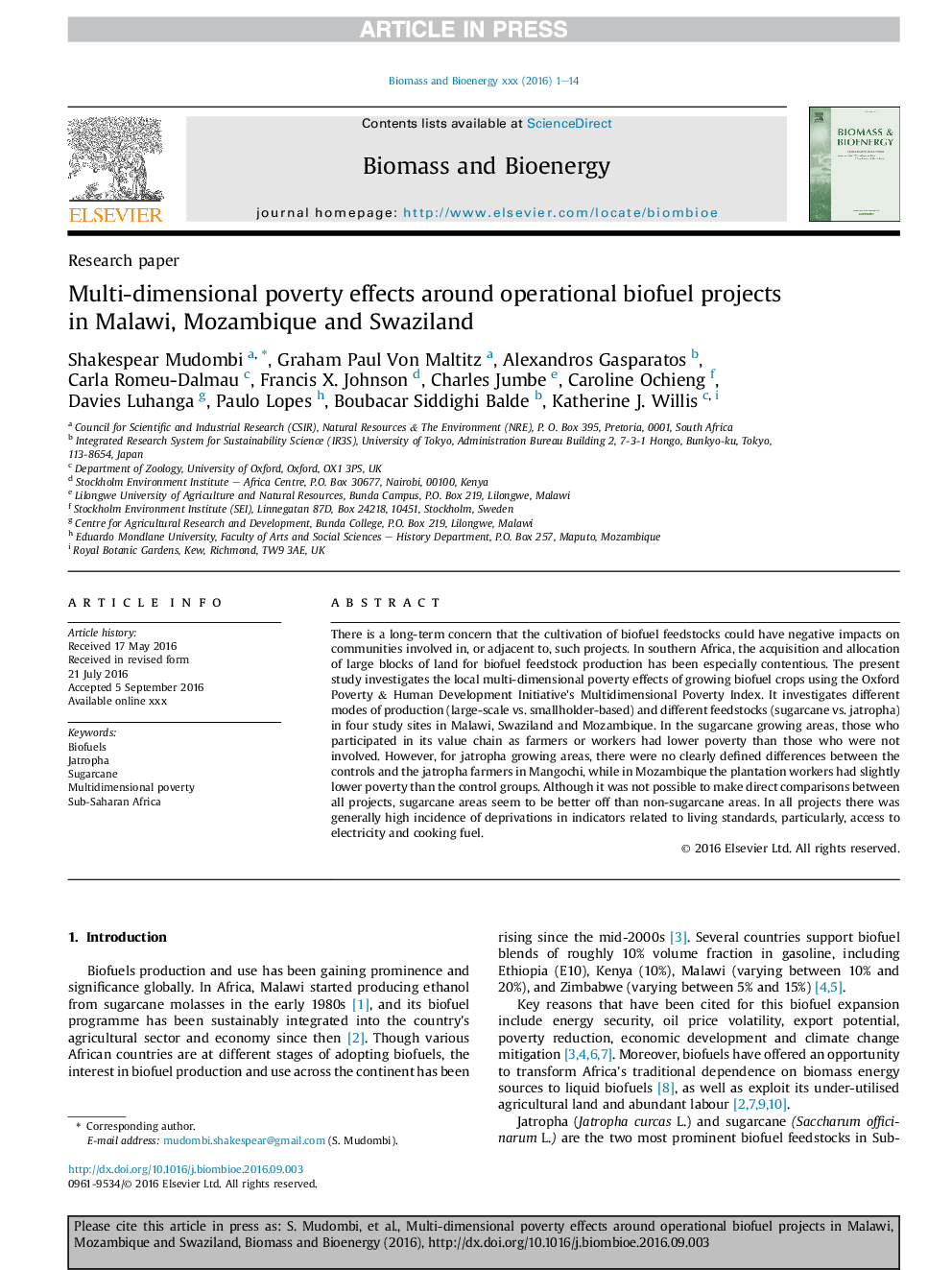| کد مقاله | کد نشریه | سال انتشار | مقاله انگلیسی | نسخه تمام متن |
|---|---|---|---|---|
| 7062879 | 1459779 | 2018 | 14 صفحه PDF | دانلود رایگان |
عنوان انگلیسی مقاله ISI
Multi-dimensional poverty effects around operational biofuel projects in Malawi, Mozambique and Swaziland
ترجمه فارسی عنوان
اثرات فقر چند بعدی درمورد پروژه های سوخت زیستی عملیاتی در مالاوی، موزامبیک و سوازیلند
دانلود مقاله + سفارش ترجمه
دانلود مقاله ISI انگلیسی
رایگان برای ایرانیان
کلمات کلیدی
ترجمه چکیده
یک نگرانی طولانی مدت وجود دارد که کشت مواد زیستی سوخت می تواند تاثیرات منفی بر جوامع درگیر در پروژه های مجاور و یا مجاور آن ها داشته باشد. در جنوب آفریقا، خرید و تخصیص بلوک های بزرگ از زمین برای تولید مواد زیستی سوختی به ویژه متضاد بوده است. در این تحقیق، اثرات فقر چندبعدی محلی زیست محیط زیست در حال رشد با استفاده از شاخص فقر چندمرحلهای طرح فقر و توسعه بشری آکسفورد مورد بررسی قرار گرفته است. این تحقیق به روشهای مختلف تولید (مقیاس بزرگ در مقابل مالداری) و مواد مختلف (نیشکر و ژتروفا) در چهار سایت تحقیقاتی در مالاوی، سوازیلند و موزامبیک مورد بررسی قرار میگیرد. در مناطق رو به رشد نیشکر، افرادی که در زنجیره ارزش خود به عنوان کشاورزان یا کارگران شرکت داشتند فقیرتر از کسانی بودند که درگیر نبودند. با این حال، در مناطق رویشی جاتروفا، تفاوت میان گروه شاهد و کشاورزان در منگوچچی تفاوت چندانی نداشت، در حالی که در موزامبیک کارکنان کاشته، فقر کمی نسبت به گروه های کنترل داشتند. اگرچه امکان مقایسه مستقیم بین همه پروژه ها وجود نداشت، اما مناطق نیشکر به نظر می رسد بهتر از مناطق غیر نیشکر است. در همه پروژه ها، میزان بروز محرومیت در شاخص های مرتبط با استانداردهای زندگی، به ویژه دسترسی به برق و سوخت پخت و پز، زیاد بود.
موضوعات مرتبط
مهندسی و علوم پایه
مهندسی شیمی
تکنولوژی و شیمی فرآیندی
چکیده انگلیسی
There is a long-term concern that the cultivation of biofuel feedstocks could have negative impacts on communities involved in, or adjacent to, such projects. In southern Africa, the acquisition and allocation of large blocks of land for biofuel feedstock production has been especially contentious. The present study investigates the local multi-dimensional poverty effects of growing biofuel crops using the Oxford Poverty & Human Development Initiative's Multidimensional Poverty Index. It investigates different modes of production (large-scale vs. smallholder-based) and different feedstocks (sugarcane vs. jatropha) in four study sites in Malawi, Swaziland and Mozambique. In the sugarcane growing areas, those who participated in its value chain as farmers or workers had lower poverty than those who were not involved. However, for jatropha growing areas, there were no clearly defined differences between the controls and the jatropha farmers in Mangochi, while in Mozambique the plantation workers had slightly lower poverty than the control groups. Although it was not possible to make direct comparisons between all projects, sugarcane areas seem to be better off than non-sugarcane areas. In all projects there was generally high incidence of deprivations in indicators related to living standards, particularly, access to electricity and cooking fuel.
ناشر
Database: Elsevier - ScienceDirect (ساینس دایرکت)
Journal: Biomass and Bioenergy - Volume 114, July 2018, Pages 41-54
Journal: Biomass and Bioenergy - Volume 114, July 2018, Pages 41-54
نویسندگان
Shakespear Mudombi, Graham Paul Von Maltitz, Alexandros Gasparatos, Carla Romeu-Dalmau, Francis X. Johnson, Charles Jumbe, Caroline Ochieng, Davies Luhanga, Paulo Lopes, Boubacar Siddighi Balde, Katherine J. Willis,
